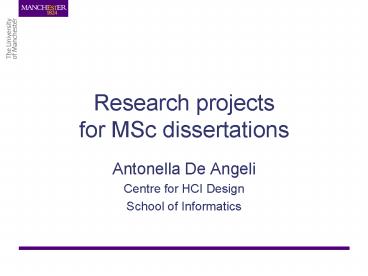Research projects for MSc dissertations - PowerPoint PPT Presentation
Title:
Research projects for MSc dissertations
Description:
Use and integrate established techniques in order to build a computer ... Applying proper methodology to find answers. It is challenging, tiring, fashinating ... – PowerPoint PPT presentation
Number of Views:56
Avg rating:3.0/5.0
Title: Research projects for MSc dissertations
1
Research projectsfor MSc dissertations
- Antonella De Angeli
- Centre for HCI Design
- School of Informatics
2
Styles of project
- System development
- Use and integrate established techniques in order
to build a computer-based system - Research project
- Original research on the deployment, engineering
or evaluation of a computer-based system
3
Types of research project
- Devise new algorithms
- Test existing algorithms in new context
- Develop new methodologies (design-development-eval
uation) - Investigate adoption and acceptance of IS
4
Must have
- Clear success criteria
- Is the project good or bad?
- Risk analysis
- What can go wrong?
- Contingency plan
- How do I minimise risk?
5
Acquiring knowledge
- Tenacity
- Accept ideas as valid because they have been
accepted for so long - Intuition
- Accepting ideas as valid because they feel
intuitively true - Authority
- Accepting ideas as valid because some respected
authority asserts that the ideas are true - Rationalism
- Developing valid ideas using existing ideas and
principles of logic - Empiricism
- Gaining knowledge through observations
- Science
- A process which combines the principles of
rationalism with the process of empiricism, using
rationalism to develop theories and empiricism to
test these theories
6
Scientific research
- Systematic search for information
- What distinguish scientific research from other
forms of research is the emphasis on using
integrated empirical and rational processes - gaining information through sensory experiences
and reasoning
7
Science is a way of thinking
8
Scientific research
- Is the process of formulating specific questions
and finding answers in order to understand a
phenomenon better - SCIENCE IS A PROCESS OF INQUIRY
9
- The essence of modern science is the way of
thinking, the disciplined way in which questions
are posed and answered. - It is the logical process and demands for
evidence, and NOT the technologies, that lies at
the centre of science. - It is an intellectual process, and its ultimate
goal is to understand the natural universe.
10
Asking questions
- A question is one side of an idea on the other
side is an unknown A POTENTIAL ANSWER - Asking questions is creative it is the exercise
of curiosity
11
Approach to questioning
- Disciplined rigorous scientific
- Researchers are pervasive Sceptics they
constantly challenge existing accepted wisdom - It may have some consequences
- May be undesired
- Knowledge is always incomplete it is always
tentative
12
Scientific research - stages
- Posing a question
- Developing procedures to answer the question
- Planning for and then making appropriate
empirical observation - Rationally interpreting the empirical observation
13
Elements of research
- Facts
- data or empirical observations
- Observation
- empirical process of recognising and recording
facts - Inference
- intellectual process in which conclusions are
derived from facts or ideas - Constructs
- Non observable inferred events (gravity-
electricity intelligence, personality,
user-experience)
14
Type of reasoning
- Inductive
- Begin with empirical observations and then infers
construct - Deductive
- Use the constructs as the basis of making new
specific observations - Both type of reasoning are part of science
15
Theories
- Formalised set of concepts which
- summarises and organises observations and
inferences - Provides tentative explanations for phenomena
- Provides the basis for making predictions
- A scientific theory must be
- Testable
- Contradictable
16
Models
- Description or analogy that represents something
usually unseen and/or more complex - Mini-theories
- A model REPRESENTS reality
17
Phases of a research study
- Idea-generating phase
- Identify a topic of interest to study
- Problem-definition phase
- Refine the vague idea(s) into a precise question
to be answered - Procedures-design phase
- Decide on specific procedures/methods to answer
our question - Testing phase
- Use the procedures devised in 3 to test your
idea/theory/model - Interpretation phase
- Answer your question based on results from
phase 4 - Communication phase your Dissertation!!!!
- Should include a description of all preceding
phases
18
Problem-definition phase
- Learn how other research have conceptualised,
measured, and tested these ideas - Library research
- Refine research question so that it can be
answered
19
Conclusion
- Research is asking the right questions
- Applying proper methodology to find answers
- It is challenging, tiring, fashinating































